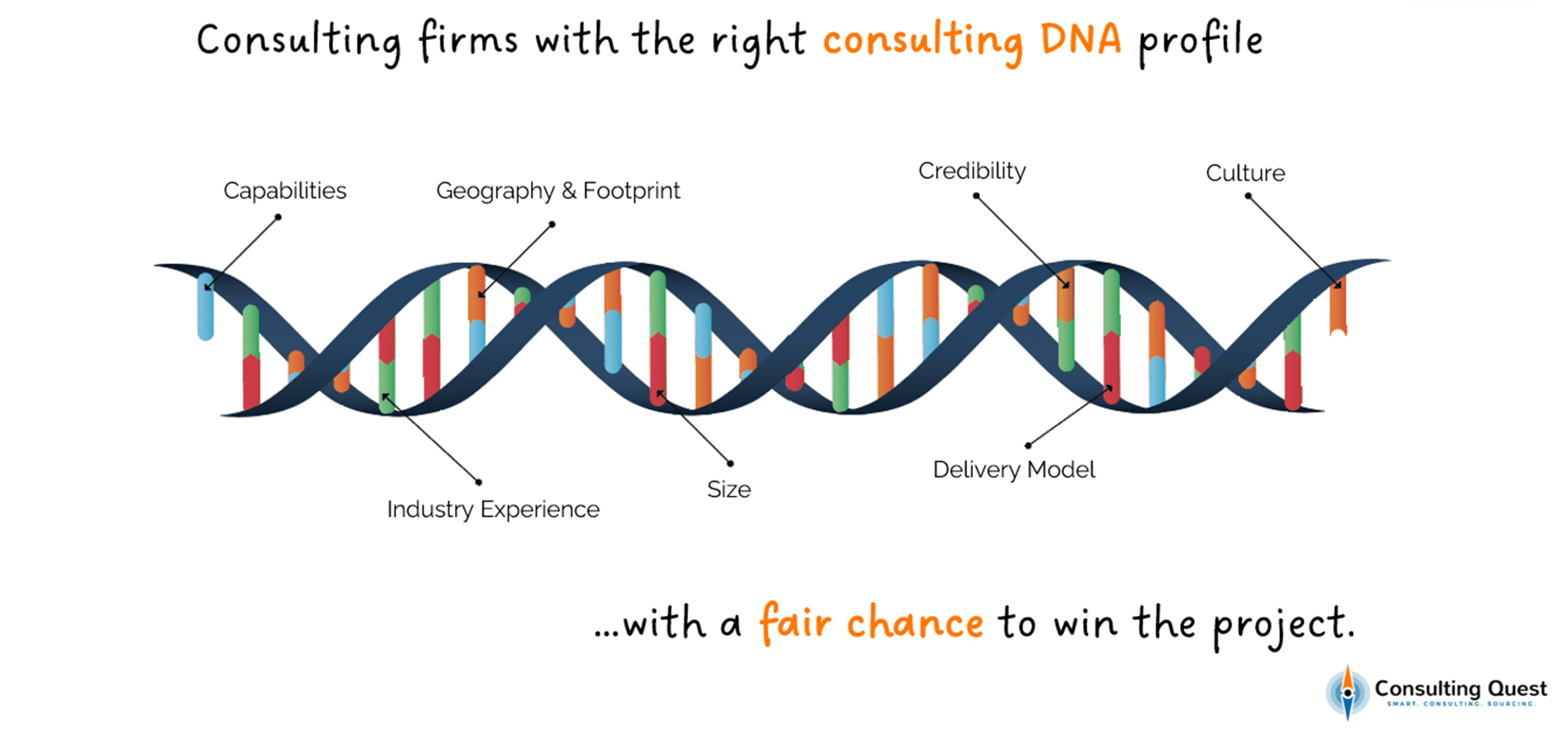“Price is what you pay; value is what you get.” So mused the oracle of Omaha, Warren Buffett. Yet, in the world of consulting services, this nugget of wisdom often gets lost amid the noise. It’s a jungle out there—a jungle teeming with consulting firms, each promising to be the Tarzan to your Jane, ready to swing you to the heights of business success. But as any seasoned explorer knows, not all guides are created equal.
In this era of abundant choices, selecting the right consulting service feels akin to finding a needle in a haystack—a haystack that’s not just vast but constantly shifting. The quest is daunting; the stakes, high. The wrong choice leaves you with a hefty bill and little to show for it, while the right partnership can catapult your project to unimagined success.
Fear not, intrepid business adventurers, for there is a compass that can guide you through this wilderness: the “Consulting DNA.” It’s not about partnering with the biggest name or the one with the most polished sales pitch. Instead, it’s about discovering a consulting firm whose essence—the very fibers of its being—resonates with your project’s soul.
You’re not just looking for consultants; you’re on the hunt for the right consultants. Those who understand your language, share your vision, and possess the exact blend of expertise, geographical footprint, and availability your initiative demands.
So, how does one embark on this epic quest for the consulting partner with the perfect “Consulting DNA”? Arm yourself with insight, prepare to delve deep, and maybe—just maybe—you’ll find the guide who can lead your project out of the wilderness and into the promised land of business excellence.
How to Define the “Consulting DNA” Profile You Need?
The concept of “Consulting DNA” emerged from the realization that the traditional metrics used to evaluate consulting firms—such as capability, industry experience, cost, and brand—offer an incomplete picture. On paper, many consulting firms might appear similar when assessed solely on these dimensions.
However, a deeper dive often reveals significant differences in how they operate and the outcomes they deliver. Despite all being competent, they cater to distinct needs and project types. This insight led to the understanding that successful consulting projects hinge on the alignment between the project’s DNA and the consulting firm’s intrinsic qualities.
Just as biologists study DNA to understand the fundamental building blocks of life, business leaders can define the “Consulting DNA” of their projects to clarify what they need from a consulting firm.
This involves not only specifying the type of consulting firm capable of undertaking the project but also delving into the unique attributes that make a consulting firm the right match. It’s about looking beyond the surface to understand the core of what makes each firm different and aligning this with the project’s unique requirements.
In essence, defining “Consulting DNA” is about achieving a match that goes deeper than surface-level compatibility. It’s about ensuring that the consulting firm’s approach, values, and strengths resonate with the project’s objectives and challenges. This concept empowers clients to navigate the diverse landscape of consulting firms more effectively, identifying those with the intrinsic markers that signal a potential for unparalleled collaboration and success.
Identifying the right Consulting DNA requires a nuanced approach. It’s not just about what consulting firms say they can do, but understanding the deeper nuances of how they solve problems, their method of engagement with clients, and the unique perspectives they bring to the table. This means looking past technical jargon and standard service offerings to grasp the true essence of a firm’s capabilities and how they align with the specific needs of a project.
Clients must become adept at translating consulting firm descriptions into a language that matches their project needs, often acting as “translators” who bridge the gap between consulting jargon and practical application. Similarly, understanding a firm’s specialized areas, such as their approach to supply chain strategy or their depth of experience in a particular industry, becomes crucial in discerning the right match.
This alignment between a project’s Consulting DNA and that of a consulting firm is what elevates a partnership from good to great. It’s the secret to unlocking a collaboration that doesn’t just meet expectations but exceeds them, delivering outcomes that truly transform businesses.

Capabilities
Understanding what capabilities will be used to deliver the project is extremely important. Besides the way, consulting firms describe their offering is rarely in line with how their clients would describe them. They tend to describe what they do but not necessarily the problems they solve. They can also use technical jargon that their clients don’t always know. You have to act as their translator.
For instance, a company will have its capabilities listed on their website: strategy, operations, and organization. For a seasoned consulting user, this description can be enough to understand what this consulting firm does. But for the average executive, it doesn’t mean much.
Besides, these three capabilities can be really broad. But at first sight, we could say that this company is handling project from high-level strategy down to operations excellence. Quite a program!
Let’s take the same consulting firm. Now the management has decided to change their website and detail further their capabilities.
- Supply Chain Strategy
- Supply Chain Organization
- Distribution Strategy
- Asset & working capital optimization
Now you see that the consulting firm is specialized in the strategic, organizational and operational aspects of Supply Chain. Much easier to understand, right?
Industry Experience
Defining the industry experience that you are looking for is an easier task. However, be careful to pick up the details of the context and the expected results to define finely what breadth and depth of knowledge you need.
For instance, if you look at the Oil & Gas industry, you can be interested in the industry broadly, or maybe your project is about Upstream Operations, or even Exploration/Production, and more precisely about Well Stimulation.
Geography & Footprint
The scope of your project can call for a global company or a company with offices in a given country. Consider the locations where the consulting firm will need to work, the languages they will need to speak, the cultures they need to understand. Think also about where and how the team should interact with the project leaders.
Let’s consider a lean project for a High-Tech company based in Germany with factories in Korea and the US. You might want to find a company with offices and consultants in both countries.
Just picture, for a minute, a German guy walking through a Texas factory (works well with the Seoul factory as well actually) to explain how to organize the work. Consider also the travel expenses into the equation. When the consultant comes from far away, the additional expenses can go up to 25-30% of your initial project amount.
Do you really need the consultants onsite? Can you leverage modern communication technologies? These are questions you really need to ask yourself!
Size
What are your policies regarding small firms or even independent consultants? What is your timeline for your project? If you have a tight timeline, and multiple locations, you might consider a larger company with a global footprint. If your timeline is looser, and you only need support in one single location, you can probably make it work with a smaller firm.
Budget
Knowing your budget is crucial to source your consultants. Consulting fees can vary from one firm to the next by a factor up to five. It is not a surprise that large consulting firms will charge more than smaller ones.
The size of a consulting firm is usually a decent proxy to estimate the consulting fees. If you have a tight budget, you will look at small local boutiques. If your budget is more comfortable, you can test several sizes of consulting firms.
Credibility
Credibility is usually established through 3 main channels: brand, thought leadership and partner profile. Sometimes, you WILL need a brand for your project. When your project has a board exposure, or when the value expected is largely political, you want to work with the large players.
They will have the credibility at the highest level of the company and with your investors, and the shoulders large enough to roll with the punches if you need a scapegoat.
Companies with relevant thought leadership can bring you insights at the right level of expertise and on niche fields. Let’s say that you are looking for deep expertise in the multimodal transportation for process industries for instance.
Your teams are reluctant to work with consultants because they “know nothing.” Now you bring a consultant who wrote a book, or several white papers, about network distribution optimization and multimodal transportation. There is a good chance that your teams will welcome this consultant.
Culture
Companies are more and more global. Their teams are more ethnically, culturally and linguistically diverse than ever. Beyond language, many elements of business life are different from one country to the next: management culture, business etiquette, communication preferences, etc.
Which Northern European hasn’t patted her fingers on the table with a tiny bit of exasperation while waiting for her late French, Italian or Spanish colleagues for a meeting? And conversely what Southern European hasn’t grumbled about the lack of flexibility of their Germain or Dutch colleagues? You find the same differences in every single part of the world.
When you have a highly-sensitive project in Asia, you might want to find consultants that understand the local culture and speak the language. Part of the consultants’ job is to establish trust with their clients’ teams. When 50% of the message is lost in translation, the exercise can become high-level aerobatics.
Delivery Model
Last but not least, you need to think about how you want to collaborate with your consultants. Do you want them to help you diagnose the problem or design your strategy? Or do you want them to support the implementation of your decisions? Consulting firms rarely excel at both. Besides, implementation consultants are usually less expensive than strategy consultants.
Another dimension to take into account is the hard vs. soft approach. Let’s imagine that you want to reorganize your procurement team and redesign the processes. Ask yourself what is your priority? Is it to get the buy-in of your existing teams? Are you looking for a collaborative approach? In that case, you need to look for a consultant with a high-sensibility to change.
But if your main priority is to get the work done, then you will need a consultant more focused on the hard aspects of the project. Finally, how senior do you need your consultants to be? If you want to professionalize your teams in the process, then you will need consultants that transfer knowledge.
Hence, you want to work with senior consultants that have an on-field experience. If you are mainly interested in the results of the project then you could work with younger consultants supervised by a more senior colleague.
Conclusion
Embarking on the quest for the ideal consulting partner is not a mere exercise in procurement; it’s a strategic voyage pivotal to the future of your business. Armed with a keen understanding of the Consulting DNA that resonates with your project’s soul, the task ahead is clear but far from simple. It demands more than a lukewarm effort; anything less is akin to navigating uncharted waters with a blindfold.
The harsh reality? Settling for a consulting partner without aligning their DNA with your project’s unique blueprint is not just lazy—it’s a perilous oversight that jeopardizes value and inflates costs. Can your business afford to pay a premium for mediocrity, or worse, mismatched expertise?
The landscape is littered with tales of ventures that failed to heed this call, paying dearly not in just dollars but in lost opportunities and strategic misalignments. The right consulting partner is not a luxury; it’s a necessity. It’s about making a choice—a choice to prioritize skills, culture, expertise, and all that constitutes your “ideal Consulting DNA” with surgical precision.
Creating your consulting wish list is more than a theoretical exercise; it’s a strategic blueprint that separates the triumphant from the forgettable. It’s about discerning the non-negotiables from the desirable, understanding that the quest for the perfect consultant may be fraught with compromises but should never compromise on your project’s core needs.
So, as you stand at this crossroads, ask yourself: Will you take the path of least resistance, or will you rise to the challenge of strategically aligning with a consulting firm that doesn’t just meet expectations but exceeds them, transforming cost into unparalleled value?
The choice is stark, and the stakes are high. Working with the right consultants is not just a procurement decision; it’s a declaration of your business’s strategic intent and its commitment to excellence. Dare to demand more than the status quo. Your project deserves no less.
consulting dna consulting dna consulting dna consulting dna
consulting dna consulting dna consulting dna consulting dna
consulting dna consulting dna consulting dna consulting dna
consulting dna consulting dna consulting dna consulting dna
consulting dna consulting dna consulting dna consulting dna

How Consource Can Help?
Consource is built on collaboration, recognizing that the synergy between stakeholders, buyers, and consultants is pivotal in unlocking the full potential of consulting value. Our platform fosters a collective effort, where these essential players join forces to create sourcing strategies that transcend expectations.








0 Comments